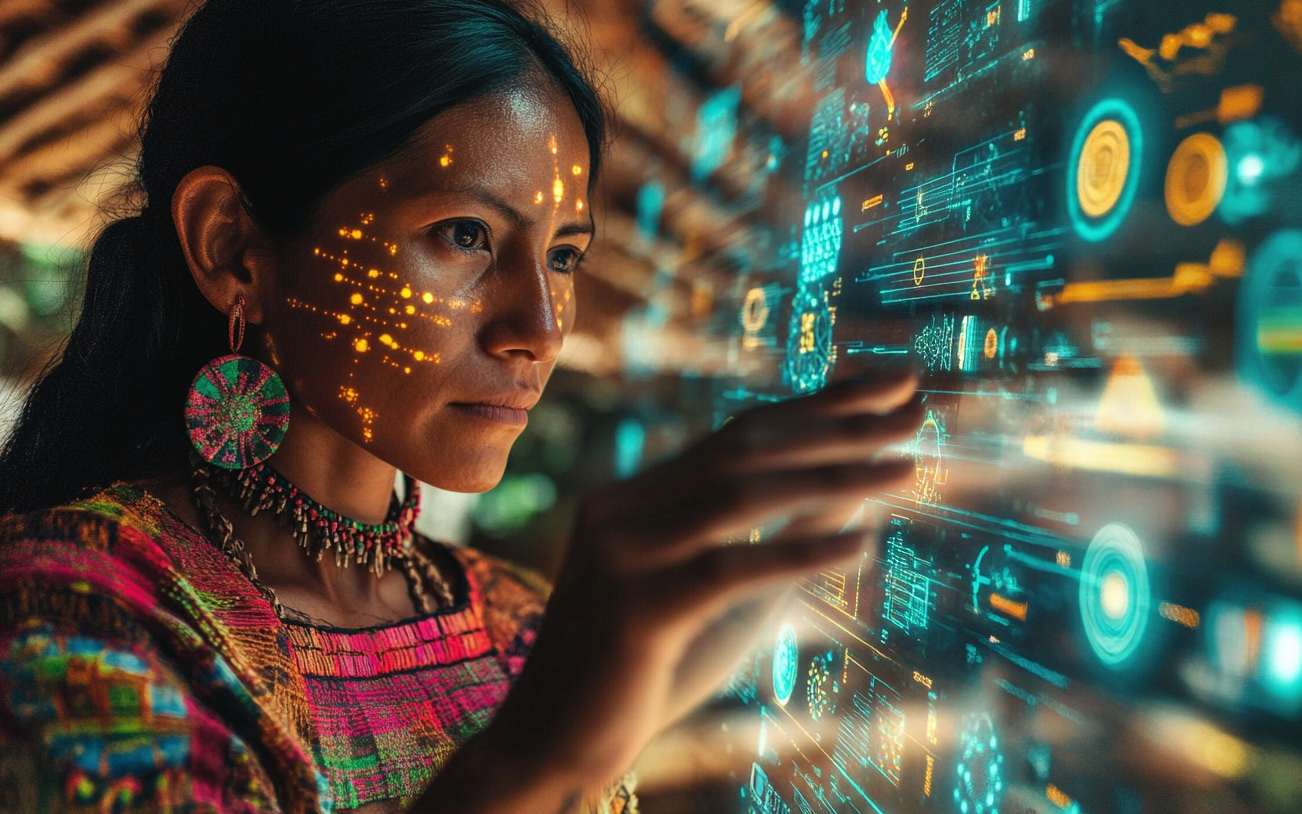Latin America is one of the world’s most diverse regions, home to over 800 Indigenous Peoples who represent around 8% of the population. According to the World Bank, this population faces severe deprivation: more than 40% live in relative poverty and suffer from cultural marginalization, limited access to decision-making spaces, and widespread discrimination. These challenges extend to access to Information and Communication Technologies (ICTs), where digital divides and the underrepresentation of Indigenous content perpetuate inequalities—highlighting the urgent need for digital decolonization and the inclusion of Indigenous worldviews in technological development.
Ancestral knowledge and vital territories for ecological sustainability
Indigenous Peoples hold a vast and diverse cultural heritage encompassing multiple languages, ancestral knowledge, and traditions that translate into health, food, and agricultural solutions, among others. Their ways of living also embody harmonious relationships with the environment—an invaluable perspective in today’s ecological crisis. Indigenous communities manage or hold rights over about a quarter of the world’s land surface, which contains 37% of all remaining natural areas, including one-third of the planet’s intact forest landscapes.

Biodiversity loss in these territories is significantly lower than elsewhere, and the likelihood of intensive agriculture is much smaller, as they have fewer pockets of deforestation. In terms of wildlife, more than 2,500 species of mammals have more than 10% of their habitats within these indigenous territories. Thus, despite enduring hardships, Indigenous Peoples possess knowledge, practices, and ancestral wisdom that are essential for ecological sustainability and the preservation of life—constituting a vital environmental legacy for humanity.
The digital divide deepens inequality
In the realm of ICTs, Indigenous Peoples encounter multiple barriers: lack of connectivity, limited access and use of digital tools, algorithmic bias, and the absence of data sovereignty. Added to this is the minimal Indigenous presence in the creation of digital content.
According to UNESCO’s 2023 report Artificial Intelligence Centered on Indigenous Peoples: Perspectives from Latin America and the Caribbean, AI systems tend to reproduce colonial ontologies and epistemologies. They amplify dominant knowledge systems and practices while excluding Indigenous perspectives. Hence, the report underscores the need for digital decolonization and local appropriation.
UNESCO also notes the stark lack of linguistic diversity in AI and online platforms. A study by Who’s Knowledge? (2022) found that only 500 of the world’s more than 7,000 languages are represented online—less than 7%. There remains a long way to go to include the vast array of Indigenous languages currently absent from the digital sphere.
Several initiatives are emerging to overcome these barriers and embed Indigenous worldviews in AI. Organizations such as Tierra Común and the Movement for Aligned Technologies are actively working to integrate cultural diversity into artificial intelligence—not just from a critical standpoint but through proactive inclusion. Other groups like the International Work Group for Indigenous Affairs and the Global Indigenous Data Alliance (GIDA) are also leading these efforts.
These movements advocate a shift from artificial intelligence to artificial wisdom. For Indigenous Peoples, wisdom encompasses an element often absent from intelligence: the ability to solve problems based on history, cultural heritage, and territorial connection—a different concept from the abstract, efficiency-driven notion of intelligence. This transition toward artificial wisdom has great potential to preserve Indigenous identities and protect both cultural and ecological heritage.
Furthermore, these approaches help democratize artificial intelligence by incorporating a diversity of voices long excluded from its development. Artificial wisdom invites the adaptation of technology to the social fabric—to the demos. In its original Greek meaning, demos refers not only to a people but also to a territorial unit, one of the foundational elements of political organization.
At the regional level, the Central American University Council (CSUCA) and the International Development Research Centre (IDRC) support the project “Strengthening the Research and Innovation Network on and with Indigenous Peoples.” This initiative seeks to build a regional network of local projects through knowledge sharing, education, and intercultural dialogue with Indigenous communities—especially women, who are key bearers of ancestral wisdom and face multiple barriers.
Ultimately, to confront the major sustainability challenges of the biosphere and recover invaluable cultural knowledge, Indigenous Peoples must be recognized as producers of knowledge, not merely as objects of study. Granting them space in content creation and integrating their wisdom into the global body of knowledge is essential for a truly inclusive and sustainable technological future.
*Machine translation, proofread by Ricardo Aceves.













